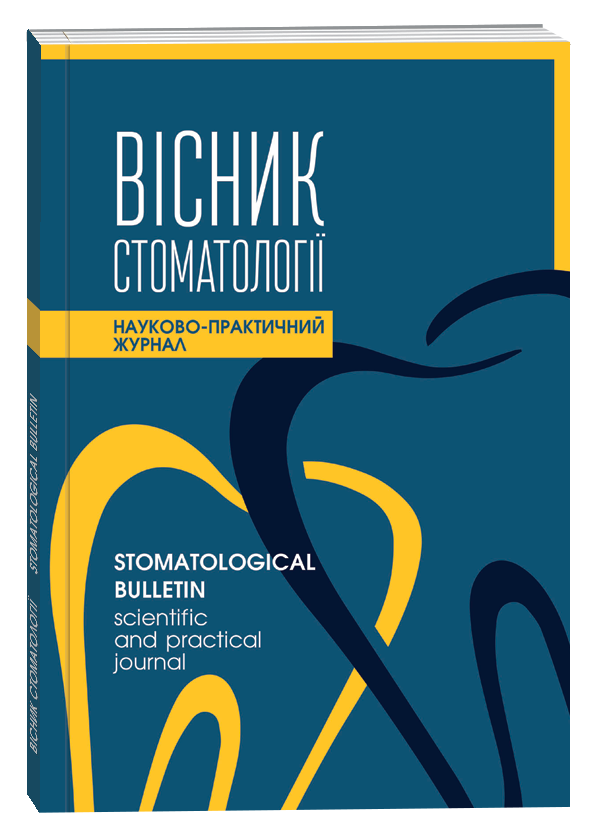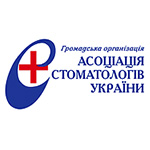COMPARATIVE CLINICAL STUDY OF THE STATE OF DIRECT DENTAL RESTORATIONS
DOI:
https://doi.org/10.35220/2078-8916-2021-42-4.5Keywords:
teeth, caries, direct restoration, clinical evaluationAbstract
Purpose of the study. Comparative clinical assessment of the state of direct restorations of lateral teeth with carious lesions of the occlusal and contact surfaces, performed by different approaches to their implementation, including open “sandwich technique”. Materials and methods of research. 156 persons aged 23 to 35 years were examined, in whom 156 molars with carious lesions of the occlusal and one of the contact surfaces were directly restored. The 1 group included 49 people (31,4%), in whom 49 molars (31,4%) were directly restored from photocomposite material; in 54 patients (34,6%) 2 groups direct recovery was performed in an open “sandwich technique” with a combination of the same photocomposite and glass ionomer cement; 53 patients (34,0%) were included in group 3, in whom 53 molars (34,0%) were also restored in an open “sandwich technique” with a photocomposite and compomer. At 6 and 12 months, the anatomical shape, condition of the contact point, marginal adhesion of the material in the equatorial and parietal areas of the contact surface, secondary caries, the boundary between the materials were visually and instrumentally assessed. Recovery efficiency was determined by the number of restorations without violations. Research results. Within 6 months, patients of group 1 were diagnosed with disorders in 3 restorations (6,1%), persons of group 2 – in 5 restorations (9,3%), patients of group 3 – in 6 restorations (11,3%). Within 12 months with violations identified, respectively, 6 restorations (13,0%), 12 (24,5%) and 11 restorations (23,4%). Conclusions. Comparative clinical evaluation of lateral tooth restorations with occlusal and contact surface lesions at 6 and 12 months showed the advantages of direct restoration of photocomposite material, the efficiency of which was 93,8% and 87,0%, respectively. With the use of open “sandwich technique” with photocomposite and glass ionomer cement, the efficiency in these terms was 90,7% and 75,5%, with photocomposite and compomer – 88,7% and 76,6%, respectively.
References
Борисенко А.В., Неспрядько В.П., Борисенко Д.А. Композиционные пломбировочные и облицовочные материалы : учебное пособие. Киев : ВСИ «Медицина», 2015. 320 с.
Николаев А.И. Практическая терапевтическая стоматология: учеб. пособие: в 3 т. / под ред. А.И. Николаева, Л.М. Цепова. 10-е изд., перераб. Москва : МЕДпресс-информ, 2018. 624 с.
ADA Council on Scientific Affairs. Direct and indirect restorative materials. J Am Dent Assoc. 2003. No 134(4). P. 463–472. doi:10.14219/jada.archive.2003.0196.
Cadenaro M., Maravic T., Comba A., Mazzoni A., Fanfoni L., Hilton T., et al. The role of polymerization in adhesive dentistry. Dent Mater. 2019. No 35(1):e1-e22. doi:10.1016/j.dental.2018.11.012.
Price R.B., Ferracane J.L., Shortall A.C. Light-curing units: a review of what we need to know. J Dent Res. 2015. No. 94 (9). P. 1179–1186. DOI:10.1177/0022034515594786.
Биденко Н.В. Стеклоиономерные материалы в стоматологии. Киев : «Книга-Плюс», 2003. 144 с.
Rodrigues Junior S.A., Pin L.F., Machado G., Della Bona A., Demarco F.F. Influence of different restorative techniques on marginal seal of class II composite restorations. J Appl Oral Sci. 2010. Jan-Feb. No. 18 (1). P. 37–43.
Ching, H.S., Luddin, N., Kannan, T. ., Ab Rahman I., & Abdul Ghani, N.R. Modification of glass ionomer cements on their physical-mechanical and antimicrobial properties. Journal of Esthetic and Restorative Dentistry. 2018. №30(6). Р. 557–571.
Удод О.А., Костенко Р.С. Прямі та непрямі реставрації зубів: клінічний стан і оцінка. Вісник стоматології. 2020. № 110(1). С. 26–30. doi:10.35220/2078-8916-2020-35-1-26-30.
Ryge G. Clinical criteria. Int Dent J. 1980. № 30(4). Р. 347–358.
Ryge G. Клинические критерии. Клин. Стоматология. 1998. № 3. С. 40–46.









